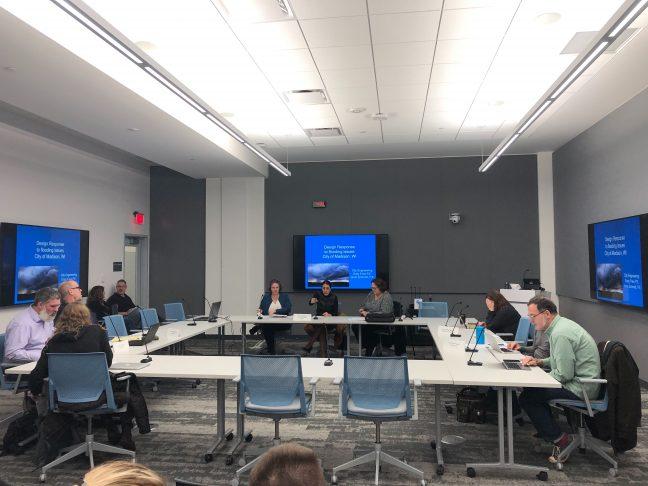The Common Council Executive Committee and Mayor Satya Rhodes-Conway met to discuss climate resilience, transportation funding and PFAS Tuesday afternoon.
They began with the recent announcement that the city of Madison received a $7 million federal grant to upgrade the metro bus system. Rhodes-Conway said this grant will allow the city to create a satellite storage facility for metro.
Rhodes-Conway said the city is currently looking into the former Oscar Mayer plant as a potential location for the storage facility. This location would be ideal because it would bring jobs to the area and it already has available electricity services, making pursuing electric buses easier, Rhodes-Conway said.
“It’s always exciting to get a grant but it’s really exciting to get this one because we could not do what we want to do with our transit system if we do not have more places to store buses,” Rhodes-Conway said.
Rhodes-Conway then addressed another recent announcement – the City of Madison partnering with the University of Wisconsin on resilience planning and preparing for climate change.
The city is partnering with UW’s Nelson Institute for Environmental Studies, the Wisconsin Institute on Climate Change Impacts and UW-Extension Dane County.
The process will take several months and will look at the expected impact of climate change in Madison, Rhodes-Conway said.
They will be focusing on the impacts climate change will have on the city’s infrastructure, and how the findings of the report can be addressed by the affected city departments, Rhodes-Conway said.
The team does not plan on creating a report, but will instead be using their findings to brainstorm solutions, Rhodes-Conway said.
“The goal is not to create a resilience report that will then sit somewhere, the goal is to actually integrate this work into what departments are already doing,” Rhodes-Conway said. “To allow people to learn that this is a way of thinking so that going forward when we are starting new projects … one of the considerations is climate resilience.”
Rhodes-Conway said she expects the first round of the process to be completed in the spring, at which point they will look into the process of resiliency planning beyond city infrastructure, looking at the greater Madison community.
The final point of discussion was PFAS. Rhodes-Conway said the city has been trying to address this issue through regular testing of known point sources and looking at purchasing practices. Rhodes-Conway said because PFAS are in so many material items exposure to them is hard to avoid.
The Madison Fire Department is currently looking into alternative forms of foam that do not contain PFAS, Rhodes-Conway said.
While the city is continuing to gather information on PFAS most of the issue lies in how consumer goods are produced, something the city has little control over, Rhodes-Conway said.
“These things are in everything, they’re in your couch, they’re in your raincoat, they’re in your non-stick cookware,” Rhodes-Conway said. “It is, I believe, patently unfair to expect local governments to deal with this, it ought to be a federal issue but we all know the likelihood of that.”


